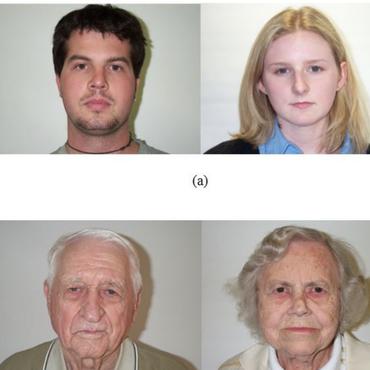Search Results for author: Alberto Abad
Found 20 papers, 3 papers with code
A new European Portuguese corpus for the study of Psychosis through speech analysis
no code implementations • LREC 2022 • Maria Forjó, Daniel Neto, Alberto Abad, HSofia Pinto, Joaquim Gago
Psychosis is a clinical syndrome characterized by the presence of symptoms such as hallucinations, thought disorder and disorganized speech.
Multilingual Transfer Learning for Children Automatic Speech Recognition
no code implementations • LREC 2022 • Thomas Rolland, Alberto Abad, Catia Cucchiarini, Helmer Strik
Our results provide a positive answer to our research question, by showing that using transfer learning on top of a multilingual model for an unseen language outperforms conventional single language-specific learning.
 Automatic Speech Recognition
Automatic Speech Recognition
 Automatic Speech Recognition (ASR)
+2
Automatic Speech Recognition (ASR)
+2
Privacy-oriented manipulation of speaker representations
no code implementations • 10 Oct 2023 • Francisco Teixeira, Alberto Abad, Bhiksha Raj, Isabel Trancoso
Speaker embeddings are ubiquitous, with applications ranging from speaker recognition and diarization to speech synthesis and voice anonymisation.
Memory-augmented conformer for improved end-to-end long-form ASR
1 code implementation • 22 Sep 2023 • Carlos Carvalho, Alberto Abad
Conformers have recently been proposed as a promising modelling approach for automatic speech recognition (ASR), outperforming recurrent neural network-based approaches and transformers.
 Automatic Speech Recognition
Automatic Speech Recognition
 Automatic Speech Recognition (ASR)
+1
Automatic Speech Recognition (ASR)
+1
A Simple Feature Method for Prosody Rhythm Comparison
no code implementations • 20 Dec 2022 • Mariana Julião, Alberto Abad, Helena Moniz
Of all components of Prosody, Rhythm has been regarded as the hardest to address, as it is utterly linked to Pitch and Intensity.
Privacy-preserving Automatic Speaker Diarization
no code implementations • 26 Oct 2022 • Francisco Teixeira, Alberto Abad, Bhiksha Raj, Isabel Trancoso
Automatic Speaker Diarization (ASD) is an enabling technology with numerous applications, which deals with recordings of multiple speakers, raising special concerns in terms of privacy.
Towards End-to-End Private Automatic Speaker Recognition
no code implementations • 23 Jun 2022 • Francisco Teixeira, Alberto Abad, Bhiksha Raj, Isabel Trancoso
This poses two important issues: first, knowledge of the speaker embedding extraction model may create security and robustness liabilities for the authentication system, as this knowledge might help attackers in crafting adversarial examples able to mislead the system; second, from the point of view of a service provider the speaker embedding extraction model is arguably one of the most valuable components in the system and, as such, disclosing it would be highly undesirable.
Using Self-Supervised Feature Extractors with Attention for Automatic COVID-19 Detection from Speech
no code implementations • 30 Jun 2021 • John Mendonça, Rubén Solera-Ureña, Alberto Abad, Isabel Trancoso
Experimental results demonstrate that models trained on features extracted from self-supervised models perform similarly or outperform fully-supervised models and models based on handcrafted features.
Domain Adaptation in Dialogue Systems using Transfer and Meta-Learning
no code implementations • 22 Feb 2021 • Rui Ribeiro, Alberto Abad, José Lopes
We evaluated our model on the MultiWOZ dataset and outperformed DiKTNet in both BLEU and Entity F1 scores when the same amount of data is available.
FoolHD: Fooling speaker identification by Highly imperceptible adversarial Disturbances
2 code implementations • 17 Nov 2020 • Ali Shahin Shamsabadi, Francisco Sepúlveda Teixeira, Alberto Abad, Bhiksha Raj, Andrea Cavallaro, Isabel Trancoso
Speaker identification models are vulnerable to carefully designed adversarial perturbations of their input signals that induce misclassification.
Pathological speech detection using x-vector embeddings
no code implementations • 2 Mar 2020 • Catarina Botelho, Francisco Teixeira, Thomas Rolland, Alberto Abad, Isabel Trancoso
We test our approach against knowledge-based features and i-vectors, and report results for two European Portuguese corpora, for OSA and PD, as well as for an additional Spanish corpus for PD.
Attentive Filtering Networks for Audio Replay Attack Detection
1 code implementation • 31 Oct 2018 • Cheng-I Lai, Alberto Abad, Korin Richmond, Junichi Yamagishi, Najim Dehak, Simon King
In this work, we propose our replay attacks detection system - Attentive Filtering Network, which is composed of an attention-based filtering mechanism that enhances feature representations in both the frequency and time domains, and a ResNet-based classifier.
Fusion of Simple Models for Native Language Identification
no code implementations • WS 2017 • Fabio Kepler, Ramon Astudillo, Alberto Abad
In this paper we describe the approaches we explored for the 2017 Native Language Identification shared task.
The DIRHA Portuguese Corpus: A Comparison of Home Automation Command Detection and Recognition in Simulated and Real Data.
no code implementations • LREC 2016 • Miguel Matos, Alberto Abad, Ant{\'o}nio Serralheiro
In this paper, we describe a new corpus -named DIRHA-L2F RealCorpus- composed of typical home automation speech interactions in European Portuguese that has been recorded by the INESC-ID{'}s Spoken Language Systems Laboratory (L2F) to support the activities of the Distant-speech Interaction for Robust Home Applications (DIRHA) EU-funded project.
 Automatic Speech Recognition
Automatic Speech Recognition
 Automatic Speech Recognition (ASR)
+1
Automatic Speech Recognition (ASR)
+1
SPA: Web-based Platform for easy Access to Speech Processing Modules
no code implementations • LREC 2016 • Fern Batista, o, Pedro Curto, Isabel Trancoso, Alberto Abad, Jaime Ferreira, Eug{\'e}nio Ribeiro, Helena Moniz, David Martins de Matos, Ricardo Ribeiro
This paper presents SPA, a web-based Speech Analytics platform that integrates several speech processing modules and that makes it possible to use them through the web.
The SpeDial datasets: datasets for Spoken Dialogue Systems analytics
no code implementations • LREC 2016 • Jos{\'e} Lopes, Arodami Chorianopoulou, Elisavet Palogiannidi, Helena Moniz, Alberto Abad, Katerina Louka, Elias Iosif, Alex Potamianos, ros
The SpeDial consortium is sharing two datasets that were used during the SpeDial project.
The DIRHA simulated corpus
no code implementations • LREC 2014 • Luca Cristoforetti, Mirco Ravanelli, Maurizio Omologo, Aless Sosi, ro, Alberto Abad, Martin Hagmueller, Petros Maragos
This paper describes a multi-microphone multi-language acoustic corpus being developed under the EC project Distant-speech Interaction for Robust Home Applications (DIRHA).










